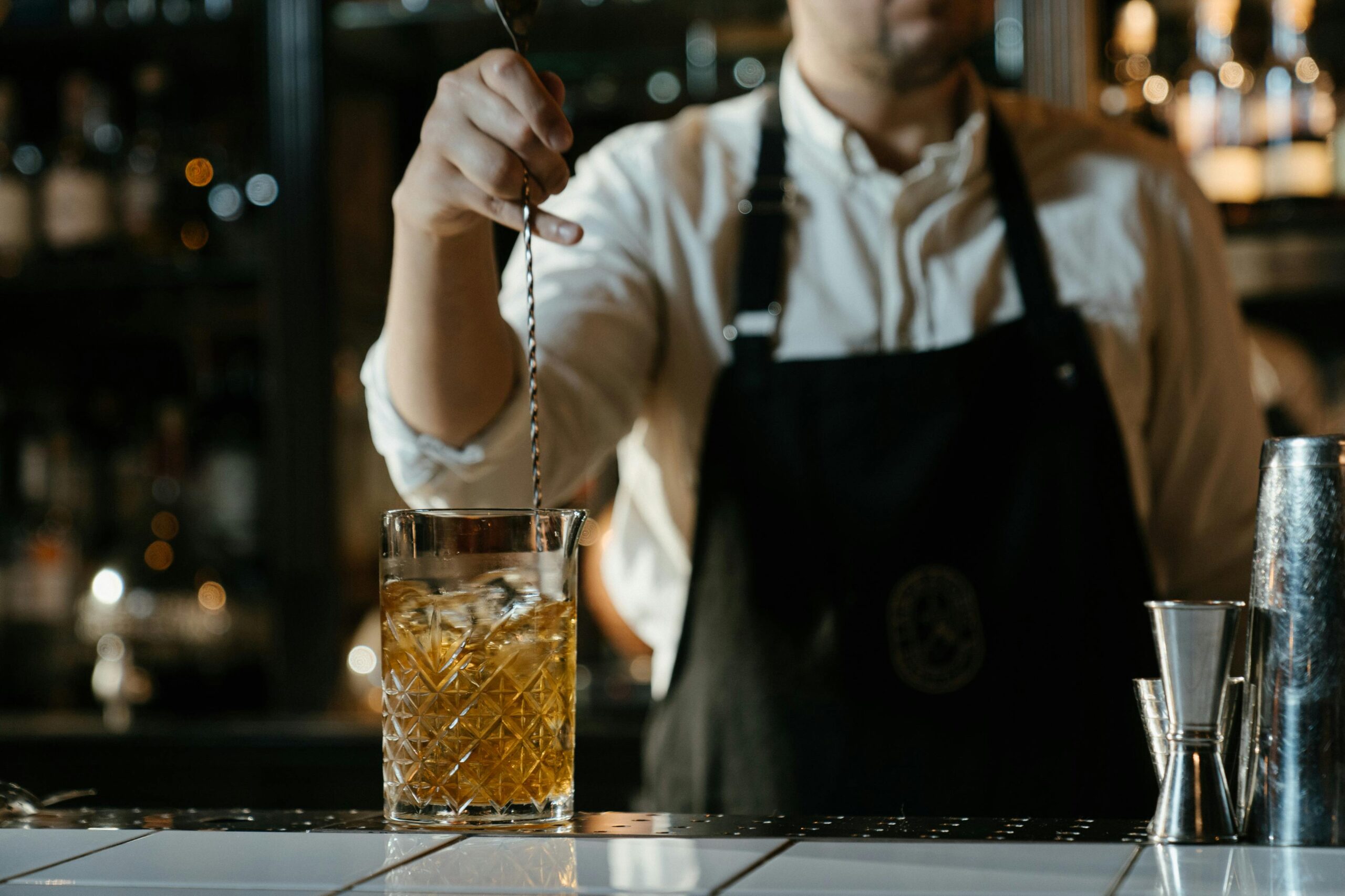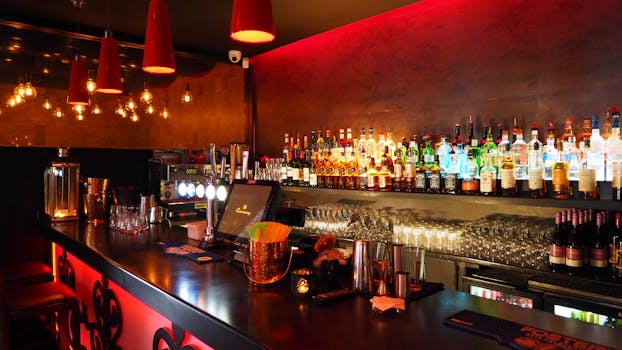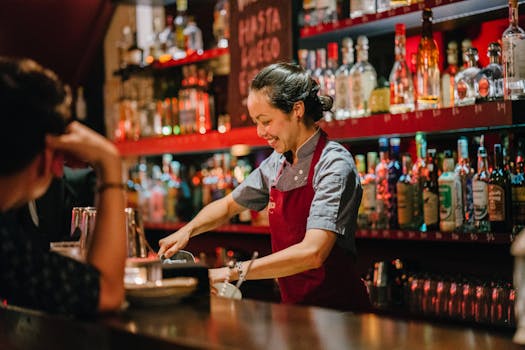8 Facts About Bartenders
Last Updated on July 16, 2025
When individuals are looking to make cash on the side when they are in school many turn to the restaurant industry for help. A common job for university/college students is working being the bar and serving drinks to the customers. Though many times people find that this job is more than just a job and before they know it becomes a full time career!
There are many places that a bartender can work: restaurants, hotels, country clubs and even cruise ships! The demand for well trained and certified bartenders is higher today than ever before. You might think you know about bartenders but how how much do you really know?
This week FoodGrads is exploring this social career and how they are integral in making sure that your night out is an enjoyable one!
1. Bartenders mix drinks
Bartenders also known as mixologists, barmen, or barkeeps are individuals responsible for:
mixing and serving drinks to customers, either directly from patrons at the bar, or through waiters and waitresses who place drink orders for dining room customers. The are knowledge about a wide range of drinks and have the skills required to mix and serve beverages using standard mixing practices. However, it isn’t just mixed drinks that they know, bartenders are also knowledgeable about premade beverages like wine or beer.
One of the best aspects of a bartenders job is to interact with customers and provide enjoyable experiences through good conversation and service. Depending on the facility some barkeeps are required to manage bar operations and perform inventory on liquor and bar supplies. In addition to tending to patrons drink orders bartenders also clean bars, tables and works areas. Finally, they perform ID checks on patrons to ensure that all individuals are the legal age and manage the cash through the register.
2. Bartenders work is a variety of locations
The most common location you can find a bartender is working behind the bar of your local neighborhood restaurant. This is because there are many of these restaurants around. Though did you know that there were many other locations as well? Here are some other examples of places you can find bartenders.
- Country Clubs– Country clubs are privately owned clubs which require members to pay for membership. These locations have less interactions with customers but is still a fast paced environment due to the amount of members.
- Night Clubs- Trendy nightclubs can be have high volumes of patrons so a bartender needs to be prepared to busy all night long. Due to the nature of these establishments these professionals need to have the strength to work late into the night.
- Hotels- Hotels are considered elite locations for bartenders to work and you generally need a lot of experience before you work there. Many hotels provide higher pay, standard shifts and even employee benefit packages. However, you need to uphold a clean dress code and a clean bar.
- Cruise Ships- Do you want to work on the open sea? Then you should become a cruise ship bartender! These bartenders generally work longer hours because when on a cruise everyone is on vacation. However, in their off hours these professionals can explore the ship and have their won “mini” vacation.
- Resorts- This might not be as common in North America but bartenders can also work in resort locations. These places have some of the most beautiful views and usually have people celebrating some of the best times of their lives (weddings, vacations). Usually tips are good.
3. Bartenders have this education
Some bartenders qualify through related work experience. They may start as barhands and progress into full-fledged bartenders as they learn basic mixing procedures and recipes. The top bartending schools might not replace the years of experience required to truly learn the art of cocktail-making, but they can be a fun way to up your skills in a hurry.
No formal education is required to become a bartender. However, some aspiring bartenders acquire their skills by attending a school for bartending or by attending bartending classes at a vocational or technical school. Many culinary schools offer courses in bartending which teaches students about mixology. The length of each program varies, but most courses last a few weeks.
4. Bartender sometimes perform flair bartending
Flair bartending is a term used to describe bartenders who entertain their during a guests drinking experience. They manipulate bar tools such as shaker and liquor bottles by performing tricks during the process of making drinks. They perform tricks such as juggling bottles, mixers and sometimes even put the liquor bottles on fire. These bartenders are more typically seen in entertainment district locations like Las Vega or New York. Being able to perform these tricks will definitely give you the competitive edge against other bartenders in the business.
5. Bartenders generally work poor hours
Bartenders generally work long hours as the shifts can last 10 to 12 hours on average. These shifts can go late into the night because this is when most people do their drinking. These professionals also need to be comfortable working weekends and holidays. They do say that three nights a bartender always works are March 17, October 31 and December 31.
6. Bartenders are listeners
Have you ever heard the comparison that a good bartender is like a psychologist? There is strangely a certain amount of truth to it. At the bar many patrons are willing to chat because they simply want someone to talk to. As a result, bartenders generally are good listeners and they want to help individuals with the problems simply by listening.
7.Bartenders have a good memory
There are many reasons why bartenders need to have a good memory. Firstly, it is important to remember the drinks of the patrons especially during busy hours. Secondly, it is important to have a thorough knowledge of beer, wine and spirits, and recipes of cocktail recipes. Not only that but a good memory of the clients attending the bar as this builds good relationships in the long run.
8. Bartenders have these set of skills
Being a bartender requires a range of skills however there are a few which are more essential than others. These skills include:
- Interpersonal skills: Bartenders are constantly interacting with patrons of the bar and other other co-workers. They need to provide a sense of comfort, listen and speak with customers or co-workers using clear, professional, and respectful language at all times.
- Ability to multi-task: These professionals need to be able to multi-task in order to get through the night and have everybody served. For example, when you are are running credit cards for a customer you could be pouring drinking for other customers. If they didn’t do this then this would mean some unhappy customers!
- Composure- Bartenders are in the centre of the stage at all times meaning any expressions you have on your face can be seen by the customer. Things can get overwhelming if the bar gets busy but a good bartender can keep their composure at all times.
Author: Veronica Hislop Veronica is a recent FoodGrad working as Quality Assurance Technician at a snack food company. She graduated with a Chemistry degree at Ryerson University and has a passion for bringing awareness to sustainability in the food industry. When Veronica is taking a break from her food endeavours you will find her at home reading a great novel and playing with her cats.






leave your comment